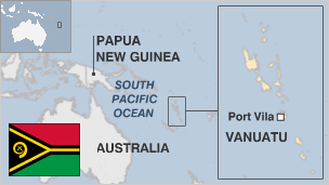
Facts and stats about Vanuatu
Newly-elected Prime Minister Joe Natuman has committed a back-to-basics strategy in running Vanuatu. The new chief executive replaced Moana Carcasses Kalosil who lost a vote of no confidence in parliament. Natuman obtained 40 of 52 votes cast by Members of Parliament. He was the only nominee for the post of Prime Minister.
Last year, the government forged a deal with a company based in Singapore to construct a new international airport as well as rehabilitate some regional airports. The deal is for Vanuatu to issue four separate promissory notes as repayment of $350 million should the government or any future administration violates the accord.
Majority of Vanuatu's population lives in the countryside where subsistence farming and fishing are primary sources of livelihood. Although agriculture is a vital export industry, Vanuatu's economic growth is fuelled mainly by tourism and construction. Tourism services consist of wholesale and retail trade, hotels and restaurants, transport and communications. These account for roughly 40 percent of the country’s GDP. Construction activity is pushed by private-sector retail, residential and internationally-funded government construction projects.
Vanuatu has a unicameral system of government. The 52 members of Parliament are elected to a four-year term by universal adult suffrage. The President of the Republic is elected for a five-year term through secret balloting by an electoral college made up of Parliament and Presidents of Vanuatu's six provincial governments.
Vanuatu has a close relationship with Australia. In fact, Australia is the biggest aid donor and primary source of tourists and investments. Australia maintains a High Commission in Port Vila while the Vanuatu Government established a High Commission in Canberra in March of 2012. Australia is Vanuatu's largest bilateral aid donor. Australian aid is guided by the Australia-Vanuatu Development Partnership which concentrates on the improvement of economic authority, infrastructure, education, justice, health delivery services, and justice.
- Agriculture 71
- Background 10
- Cost of living 36
- Crime 13
- Culture 13
- Disasters 2
- Economy 1981
- Education 358
- Energy 198
- Environment 104
- Geography 72
- Government 173
- Health 215
- Import 1
261,565
Population. Ranked 183th in 2013.
$3,176.21
GDP per capita. Ranked 114th in 2012.

12,190 sq km
Sq. km. Ranked 151st in 2008.